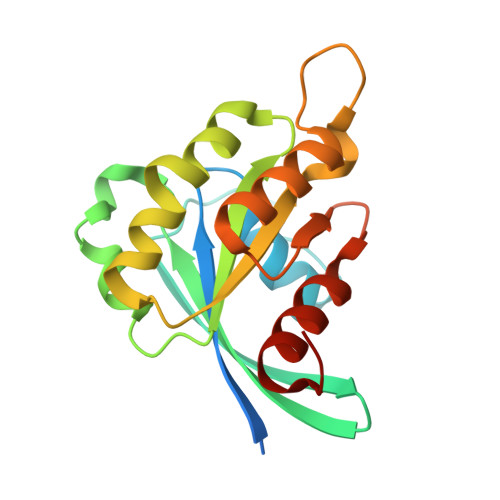Unique structural and nucleotide exchange features of the Rho1 GTPase of Entamoeba histolytica.
Bosch, D.E., Wittchen, E.S., Qiu, C., Burridge, K., Siderovski, D.P.(2011) J Biol Chem 286: 39236-39246
- PubMed: 21930699
- DOI: https://doi.org/10.1074/jbc.M111.253898
- Primary Citation of Related Structures:
3REF, 3REG - PubMed Abstract:
The single-celled human parasite Entamoeba histolytica possesses a dynamic actin cytoskeleton vital for its intestinal and systemic pathogenicity. The E. histolytica genome encodes several Rho family GTPases known to regulate cytoskeletal dynamics. EhRho1, the first family member identified, was reported to be insensitive to the Rho GTPase-specific Clostridium botulinum C3 exoenzyme, raising the possibility that it may be a misclassified Ras family member. Here, we report the crystal structures of EhRho1 in both active and inactive states. EhRho1 is activated by a conserved switch mechanism, but diverges from mammalian Rho GTPases in lacking a signature Rho insert helix. EhRho1 engages a homolog of mDia, EhFormin1, suggesting a role in mediating serum-stimulated actin reorganization and microtubule formation during mitosis. EhRho1, but not a constitutively active mutant, interacts with a newly identified EhRhoGDI in a prenylation-dependent manner. Furthermore, constitutively active EhRho1 induces actin stress fiber formation in mammalian fibroblasts, thereby identifying it as a functional Rho family GTPase. EhRho1 exhibits a fast rate of nucleotide exchange relative to mammalian Rho GTPases due to a distinctive switch one isoleucine residue reminiscent of the constitutively active F28L mutation in human Cdc42, which for the latter protein, is sufficient for cellular transformation. Nonconserved, nucleotide-interacting residues within EhRho1, revealed by the crystal structure models, were observed to contribute a moderating influence on fast spontaneous nucleotide exchange. Collectively, these observations indicate that EhRho1 is a bona fide member of the Rho GTPase family, albeit with unique structural and functional aspects compared with mammalian Rho GTPases.
Organizational Affiliation:
Department of Pharmacology, University of North Carolina, Chapel Hill, North Carolina 27599-7365, USA.
















